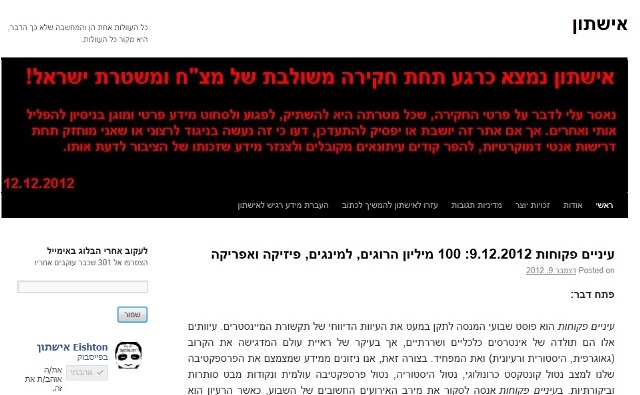The Israeli blogger ‘Eishton‘ has been questioned by civilian and military police in an attempt to make him reveal a whistleblower who supplied him with unclassified military documents. His interrogation has attracted media attention to the anonymous blogger and his writing.
Eishton (a combination of the Hebrew words for “newspaper’ and “man”) was interrogated by police in an attempt to push him into giving up a source within the army or the Ministry of Defense, who helped him in his unique in-depth three–part research on army casualties.
Following the interrogation, Eishton published a warning on his blog, stating that he is not allowed to discuss details of the investigation, “the aim of which is to silence, hurt and extract private and protected information in an attempt to incriminate me and others.” The blogger also warns that should his site go offline, it is probably be because he was pressured to censor information or give up sources. In a recent Facebook post Eishton also states that investigative authorities convinced the court to give them warrants to force internet companies to reveal his identity, and which have enabled invasive searches in his and his relatives’ homes.

The research at the heart of the investigation was published last April, around Israel’s Memorial Day, and focused both on the lack of information regarding the circumstances of soldier deaths, and on the disproportionally large numbers of soldier suicides, as compared with civilian suicides. Eishton found out that while politicians and journalists were mourning the loss of 126 soldiers who had officially “died while protecting their country” between April 2011-2012 – the number of soldiers who had actually been killed in combat that year was no more than three. What about the rest? Eleven are actually civilians killed in terrorist attacks; 35 did not even pass during that year, but were retroactively recognized as “fallen soldiers”; and all the rest died from various other reasons, ranging from disease, to car crashes, to the number one cause of death in the army – suicide. Thanks to his source in the army or Ministry of Defense, Eishton discovered exactly how many soldiers had committed suicide, and how this was generally hidden by authorities. It is this source, who helped expose the real numbers and causes of death, who authorities are now trying to hunt down – and who Eishton is determined to protect.
The story of the interrogation has been covered widely by Israeli media, with some trying to make comparisons to the story of Uri Blau and Anat Kamm. Haaretz reporter Barak Ravid was the first to write about it in his blog, and followed up on the story with the help of his colleague Amos Harel. IDF sources confirmed that an investigation was under way by the Criminal Investigation Division, as as “bereaved families told the IDF that details of the circumstances surrounding their sons’ deaths were published on the Internet, based on what appeared to be ‘slain persons reports,’ internal military reports that document the investigations into deaths of soldiers.”
Ravid himself was interviewed on Channel 10 last night, and expressed the belief that had Eishton been a recognized journalist, authorities would not have dared to try and breach the confidentiality of his source. Moshe Negbi, one of Israel’s leading authorities on journalism and law, said, however, that the problem lies with the fact that Israel has no laws protecting journalists’ sources, and that judicial rulings on the matter have always left whistleblowers within the security apparatus as an exception to journalistic immunity, without any protection.
Other journalists took on Eishton’s challenge, and started digging into causes of soldiers’ deaths and the question of suicides, yet it seems that so far none have managed to match Eishton’s thoroughness. He has commented on some of these reports in his latest post, which was translated in part and published on Ravid’s blog.
Who is Eishton?
One of the amazing things about this story is that no one, aside from the police, has any idea who Eishton is. In fact, I am the only journalist known to have ever interviewed him, and I too don’t know who he his. His posts reveal a person of left-wing politics, but who is highly critical of his own political camp, as well as of mainstream media, which he blames for many of society’s illnesses. In the interview that I conducted with him via e-mail, and which was published in Zman Tel Aviv (Ma’ariv’s local supplement) in July, the blogger revealed that he used to work in jobs that brought him “six figure sums,” but that he now focuses mainly on his blog, which takes up most his time, energy and financial resources. Eishton asks readers to contribute if they like his writing to support his work.
After the interview was heavily edited and massively cut down in the paper (to my great regret) Eishton published the full version (Hebrew) of it on his blog, stating he would never give an interview again. Eishton was fair enough to say that the problem was not with his interviewer, but with the way the media industry “simply deletes whatever doesn’t conform to the picture they wish to paint.”
The IDF and the police spokesperson unit did not respond to questions sent to them by +972. Eishton has also refused all interviews this week, but stated on his homepage that he might consider offering a single interview to one specific (unnamed) publication.


